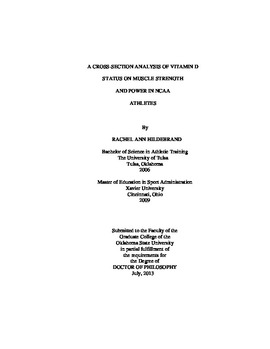| dc.contributor.advisor | Edwards, Steven W. | |
| dc.contributor.author | Hildebrand, Rachel | |
| dc.date.accessioned | 2014-09-24T14:16:57Z | |
| dc.date.available | 2014-09-24T14:16:57Z | |
| dc.date.issued | 2013-07 | |
| dc.identifier.uri | https://hdl.handle.net/11244/11018 | |
| dc.description.abstract | Purpose: The purpose of this study was to assess the prevalence of vitamin D inadequacy in collegiate athletes and to determine the influence of serum vitamin D (25-OH D) on muscle strength and power in this population. | |
| dc.description.abstract | Methods: Demographic and anthropometric data were collected on collegiate athletes (n=103) from three separate NCAA athletic programs. Dietary vitamin D and calcium intake, and sun exposure were assessed using validated questionnaires. Serum 25-OH D was evaluated and a series of physical performance measures that are established indicators of muscular strength and power were completed. The performance measures included the Vertical Jump Test, Shuttle Run Test, Triple Hop for Distance Test and the 1 Repetition Maximum (1 RM) Squat Test. Categorical data were evaluated using Chi Square and Pearson Correlations were performed to examine the relationship between serum vitamin D and performance measures. Comparisons between groups were accomplished using ANCOVA with lean body mass as a covariate. | |
| dc.description.abstract | Results: Using serum 25-OH D concentrations of 30 ng/mL and 20 ng/mL as the cutoff points for insufficient and deficient status, 68% of the study participants were considered vitamin D adequate, while 22.7% were insufficient and 8.9% were deficient. Analyses using ANCOVA revealed a lower (p < 0.05) 1 RM Squat Test when adjusting for lean body mass with vitamin D deficiency. However, no other performance measures were significantly different. | |
| dc.description.abstract | Discussion: These findings suggest that the majority of this population of collegiate athletes were vitamin D sufficient. Athletes with adequate vitamin D status may have an ergogenic advantage in terms of the 1 RM Squat compared to those who are vitamin D inadequate. Further research is needed to determine the potential implications of these findings on athletic performance and studies are warranted to determine if vitamin D supplementation can improve performance outcomes. | |
| dc.format | application/pdf | |
| dc.language | en_US | |
| dc.rights | Copyright is held by the author who has granted the Oklahoma State University Library the non-exclusive right to share this material in its institutional repository. Contact Digital Library Services at lib-dls@okstate.edu or 405-744-9161 for the permission policy on the use, reproduction or distribution of this material. | |
| dc.title | Cross-section analysis of Vitamin D status on muscle strength and power in NCAA athletes | |
| dc.contributor.committeeMember | Smith, Brenda J. | |
| dc.contributor.committeeMember | Miller, Bridget | |
| dc.contributor.committeeMember | Warren, Aric Jon | |
| osu.filename | Hildebrand_okstate_0664D_12878.pdf | |
| osu.accesstype | Open Access | |
| dc.type.genre | Dissertation | |
| dc.type.material | Text | |
| thesis.degree.discipline | Health, Leisure and Human Performance | |
| thesis.degree.grantor | Oklahoma State University | |
